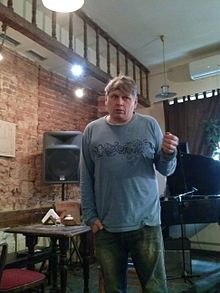Sergei Nevsky
Sergej Newski ( Russian Сергей Павлович Невский ; born October 10, 1972 in Moscow ) is a Russian composer .
Life
Sergej Newski studied music theory at the Moscow Conservatory . He then continued his studies at the Carl Maria von Weber Academy of Music in Dresden with Jörg Herchet and at the Berlin University of the Arts with Friedrich Goldmann . There he also studied music theory and music education with Hartmut Fladt from 2000 to 2005 .
Sergej Newski's music is performed at the Donaueschinger Musiktage , the Wien Modern , Eclat , MaerzMusik , Ultraschall Berlin , Musica Viva (Munich) and Warsaw Autumn festivals , among others .
He has received composition commissions from the Konzerthaus Berlin , the Staatsoper Unter den Linden , the Staatsoper Stuttgart , the Opergruppa (for the Bolshoi Theater ), the Klangforum Wien , the Deutschlandradio and the Südwestrundfunk . His opera Franziskus premiered at the Bolshoi Theater in Moscow in September 2012. In February 2020, his music theater Secondhand-Zeit premiered at the Stuttgart State Opera.
Awards and grants
- Berlin Art Prize (2014)
- Golden Mask (2014)
- Scholarship Villa Aurora in Los Angeles (2014)
- 1st prize at the composition competition of the state capital Stuttgart (2006)
- German Academy Casa Baldi (2005)
- Cité Internationale des Arts Paris (2001/02)
Compositions (selection)
Stage works
- Secondhand time (2018/19) based on texts from the novel of the same name by Svetlana Alexijewitsch
- Franziskus (2008–2012) Chamber opera in four scenes based on the play “Heiliger Franz” by Claudius Luenstedt
- Autland (2008/09) for six soloists and mixed chamber choir
Orchestral works
- 18 Episodes for Orchestra (2018/19)
- Heath (2018) for viola and string orchestra
- Cloud Ground (2015) for violin and orchestra
Ensemble works
- Letter to H. Marx (2018) for baritone and 14 instruments
- Galileo: Messenger (2017) for violin and 14 instruments
- Rules of Love (2012/13) for soprano, low alto and five instrumentalists
- Opening Gesture (2011) for violin solo, five percussionists and chamber orchestra
- Work surface (2011) for solo percussion, solo piano, solo tuba and three instrumentalists
- Alles (2008) for speakers and eight instrumentalists
- Fluss (2003/05) for voice and ensemble
Vocal works
- Island (2011) Three pieces for mixed choir, accordion and percussion for Die Nibelungen by Friedrich Hebbel
- Dolze mio drudo (2010) Scenic cantata for five voices, three brass groups and noise instruments. Alternative scoring: madrigal for five voices and four trombones ad libitum. Text: Friedrich II.
- Was flee Hase und Igel ... (2004) for six votes. Text: Einar Schleef
- Generator (2001/02) for four vocal soloists
- Vray dieu d'amours (2007) for bass and alto voice. Text: Matthaeus Pipelare
Chamber music
- Wut (2013) for flute, cello, percussion and piano
- Tcas (2011/12) for violin and five strings
- channel surfing (2010) for alto saxophone, accordion and double bass
- String Quartet No. 3 (2009)
- Blind alphabet (2007) for different occupations
Web links
- Biography and catalog raisonné at Ricordi Verlag
- Guest contribution by Sergej Newski in the FAZ: “Russia's new soul. Uprising against modernization "
- Interview on Deutschlandradio Kultur
- Interview in the nmz
- Interview of the Goethe-Institut ( Memento from August 11, 2014 in the Internet Archive )
Individual evidence
- ↑ ruhrtriennale.de. Archived from the original on August 15, 2014 ; Retrieved June 12, 2014 .
- ↑ a b villa-aurora.org. Retrieved June 12, 2014 .
- ↑ a b musikrat.de. Archived from the original on August 11, 2014 ; Retrieved June 12, 2014 .
- ↑ faz.net. Retrieved June 12, 2014 .
- ↑ Georg Rudiger: It's complicated - "Boris Godunow" and "Secondhand Time" by Sergej Newski in Stuttgart. In: Neue Musikzeitung . February 5, 2020, accessed February 21, 2020 .
- ↑ tagesspiegel.de. Retrieved June 12, 2014 .
- ↑ goldenmask.ru. Retrieved June 12, 2014 .
- ↑ 1st Prize Composition Competition Stuttgart 2006. November 24, 2006, accessed on February 21, 2020 .
- ↑ Scholarship holders Casa Baldi. Retrieved February 21, 2020 .
- ^ Chronicle of Sergei Nevsky. Retrieved February 21, 2020 .
| personal data | |
|---|---|
| SURNAME | Nevsky, Sergei |
| ALTERNATIVE NAMES | Невский, Сергей Павлович (Russian) |
| BRIEF DESCRIPTION | Russian composer |
| DATE OF BIRTH | October 10, 1972 |
| PLACE OF BIRTH | Moscow |
